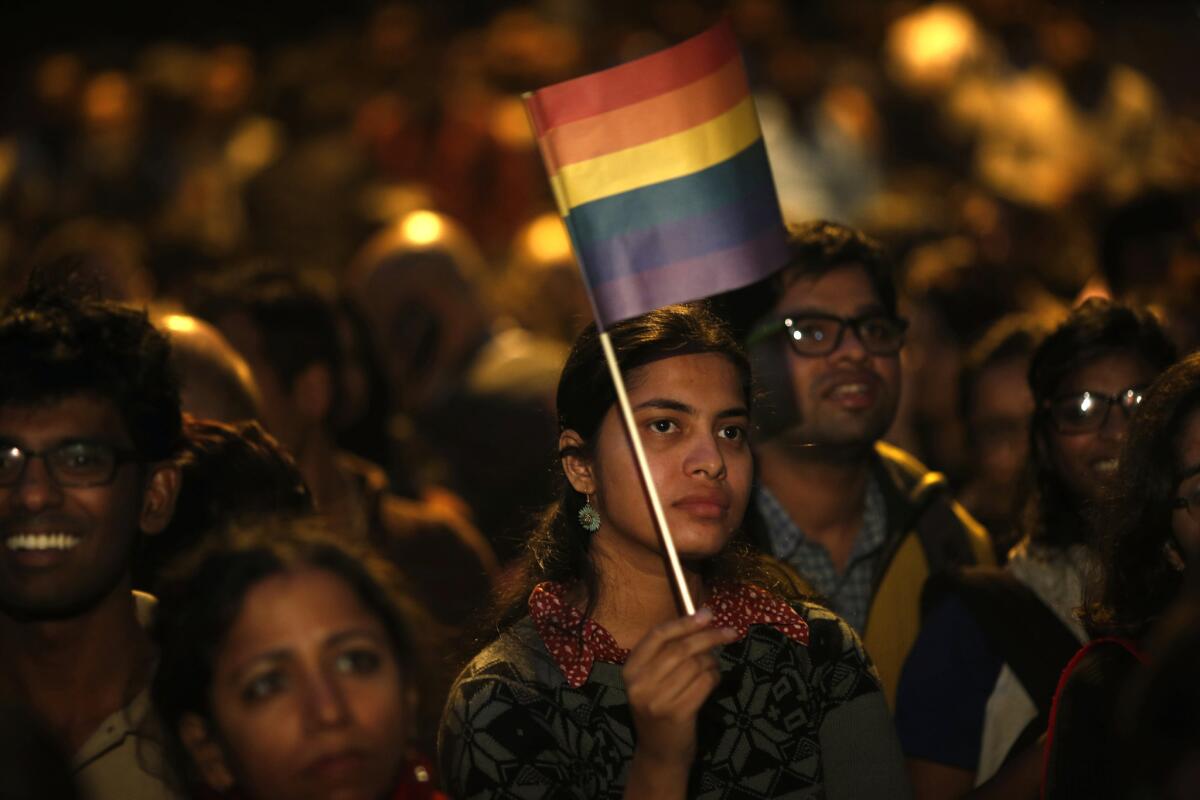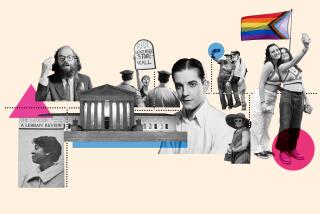India’s Supreme Court reinstates law criminalizing gay sex

- Share via
NEW DELHI — In a reversal that surprised many gay activists and flew in the face of changes seen in some other countries recently, India’s Supreme Court on Wednesday overturned a lower-court ruling, in effect making homosexuality a crime again.
The nation’s top court overturned a 2009 Delhi High Court decision that decriminalized homosexual sex between consenting adults. In Wednesday’s ruling, the top court argued that the lower court had overstepped its mandate and had no right to augment the law.
“It is up to parliament to legislate on this issue,” said Justice G.S. Singhvi, who headed the two-judge Supreme Court bench. Wednesday was his last day before retirement.
Given the slow pace of lawmaking in India, an upcoming election and polls suggesting the conservative Bharatiya Janata Party could unseat the ruling Congress Party in national elections, it’s likely the ban introduced under British colonial rule will remain in place for the foreseeable future.
Wednesday’s decision stunned gay rights and social activists who expected the court to reaffirm the 2009 ruling in keeping with many of its recent decisions, which have expanded human rights and personal liberties. Social activist groups referred to the decision as “disappointing,” “regressive” and a “black day for India.”
“I am shocked,” said Nitin Karani, a gay rights activist and former editor of Bombay Dost Magazine, which focuses on India’s homosexual community. “The judgment not only affects gay rights but the human rights of all Indians.”
Hundreds of people gathered in Bangalore, India’s high-tech hub, after the court decision, holding black banners. “Love knows no gender,” read one.
Supporters of the decision heralded it as a positive development for society.
“Homosexuality’s not natural, disturbs the continuity of life, leaves the future uncertain,” said Mujtaba Farooq, president of the Welfare Party of India, a Delhi-based Muslim political group. “This is the unacceptable influence of the West.”
Section 377 of the Indian Penal Code prohibits sexual activity “against the order of nature with any man, woman or animal.” Violators, including those involved in consensual relationships, face fines and up to 10 years in prison.
While the law has rarely been enforced, analysts say it allows the police to shake down and otherwise harass homosexuals.
India, despite having produced the Kama Sutra and being home to sexually suggestive temples and monuments, remains socially conservative. Homosexuality is still taboo in much of the country, even regarded in places as a form of mental illness, forcing many people to live double lives.
Kapil Sibal, India’s law minister, declined to comment on the judgment or whether the government would try to amend the law. The Congress Party is unlikely to tackle the issue anytime soon, however, given that it’s struggling at the polls and is wary of any issue that could provide political ammunition for the Hindu nationalist opposition.
Gay and human rights activists said they planned to appeal Wednesday’s decision under what’s known as a “curative petition” to a five-justice bench, a step they described as their last hope for a remedy any time soon.
“The nation is mourning,” said Colin Gonsalves, a prominent New Delhi-based human rights lawyer. “This is a terrible setback, but the curative petition is a slight ray of hope. If the five-judge bench upholds the Supreme Court decision, however, then this is the end of road.”
Emboldened by the 2009 law, social changes abroad and a rising middle class, gay rights activists have staged modest gay-pride parades in recent years and tried to broaden acceptance and expand their legal rights. A government notification to the Supreme Court said there were 2.5 million homosexuals in India out of a population of 1.2 billion, of which 175,000 were HIV-positive.
The 2009 ruling expanding gay rights was the result of a case filed by the New Delhi-based Naz Foundation, a charity focused on sexual rights and HIV/AIDS, which pursued the issue in court for nearly a decade.
But the ruling prompted a backlash among Hindu, Christian, Muslim and other groups, which mounted an appeal to the Supreme Court leading to Wednesday’s decision.
“If homosexuality is to be made legal, then let everyone be a homosexual,” said Kamal Farooqi, a member of the All India Muslim Personal Law Board, one of the groups that petitioned the Supreme Court. “Homosexuality is against nature’s law of reproduction. The world will end in 100 years without reproduction.”
At least 16 countries around the world recognize gay marriages, although in Britain same-sex couples will only be able to wed beginning next year. In the United States, 15 states issue marriage licenses for homosexual couples. A law allowing same-sex marriage in Illinois takes effect June 1.
This contrasts with many Mideast and African countries where homosexuality is a criminal offense, including Iran, Saudi Arabia and Sudan, where it’s punishable by death.
Russia recently passed a so-called anti-homosexual propaganda statute that bans the spread of information that a minor might see or hear, sparking overseas protests in advance of the 2014 Sochi Winter Olympic Games.
ALSO:
U.S. suspends non-lethal aid to Syrian rebels in north
Family, dignitaries pay tribute as Nelson Mandela lies in state
Ukraine protesters clash with police, demand president’s resignation
Twitter: @markmagnier
mark.magnier@latimes.com
Sharma is a special correspondent.
More to Read
Sign up for Essential California
The most important California stories and recommendations in your inbox every morning.
You may occasionally receive promotional content from the Los Angeles Times.













